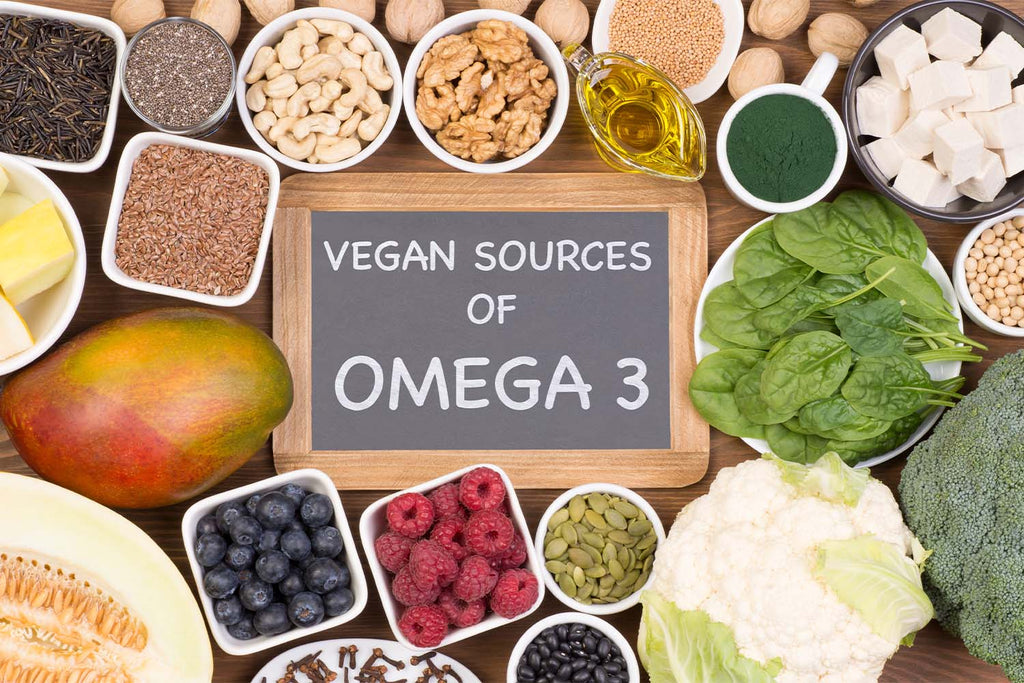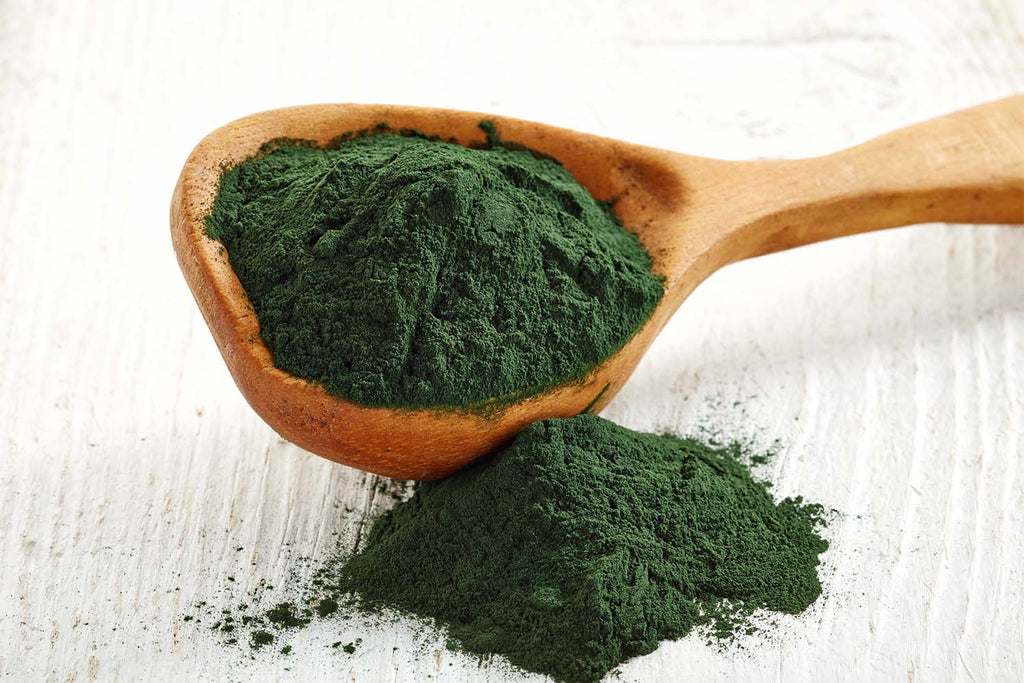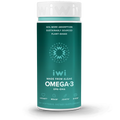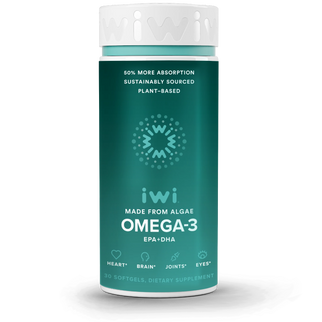Omega-3 fats are an integral part of our diet, playing a foundational role in the healthy function of our body's cells. These essential fatty acids are particularly renowned for their heart health benefits, but they also feature a wide variety of additional support for your health. However, obtaining a sufficient amount of omega-3 can be challenging, especially for anyone who’s following a vegetarian or vegan diet.
Fatty fish, such as mackerel, tuna, and salmon, are among the most well-known sources of omega-3 fats. Anyone looking to increase their daily intake of omega-3s would do well to start by adding them to their diet. Unfortunately, these aren’t vegan foods, which creates quite a challenge for anyone following a plant-based diet.
The good news is that there are many plant-based sources of omega-3. Adding a few of these foods to your diet is essential to ensuring that you’re getting enough omega-3 fats each day. If that’s not a viable option, then using a dietary supplement using vegan sources of omega-3 can be another way to ensure you’re getting the optimal amount of this essential nutrient.
Why Are Omega-3s Important?
Omega-3 fatty acids are a type of polyunsaturated fat that plays a crucial role in the body, serving as the building blocks of cell membranes and providing a key source of energy. These healthy fats are also known for supporting heart health as well as maintaining healthy triglyceride levels.
There are three primary types of omega-3s:
- Alpha-linolenic acid (ALA), an omega-3 precursor
- Eicosapentaenoic acid (EPA)
- Docosahexaenoic acid (DHA)
ALA is a short-chain omega-3 precursor and is considered an essential fatty acid, meaning it cannot be produced by the body and must be obtained through diet. ALA is most commonly found in plant oils, seeds, and nuts, making it the most abundant form of omega-3 in a typical diet.
EPA and DHA, on the other hand, are long-chain fatty acids and are only conditionally essential, as the body can produce them, albeit at very low levels. These two forms of omega-3 are crucial for specific bodily functions. For instance, DHA is a vital component of cells in the brain and eyes, making up roughly 90% of the unsaturated fatty acids in the brain, which means it’s an extremely important nutrient during pregnancy and throughout childhood. Meanwhile, EPA produces eicosanoids, which help support vital functions like heart rate and blood pressure.
Despite the body's ability to convert ALA into EPA and DHA, the conversion process is quite inefficient. For instance, only about 5% of ALA is converted into EPA, and under 0.5% of that is then converted into DHA. In young adults, men may convert as little as 8% of ALA into EPA and under 4% of EPA into DHA. Given these conversion rates, it's important to directly include both EPA and DHA in your diet either through natural foods or supplementation.
What Are the Health Benefits of Omega-3s?

Omega-3 fatty acids play a crucial role in the body, contributing to the composition of cell membranes and supporting the healthy function of numerous bodily systems. As such, maintaining a regular intake of omega-3s can provide a wide variety of health benefits:
Heart Health
DHA and EPA play a vital role in maintaining heart health. Most importantly, they support healthy blood pressure, heart rate, and blood vessel function. Additionally, they can also contribute to maintaining cholesterol levels within a healthy range. Regular intake of omega-3s can significantly support cardiovascular function, making them an essential part of a heart-healthy lifestyle.
Brain Health
DHA is crucial for brain health as it maintains healthy brain cells, supporting processing speed and cognitive function. Additionally, DHA is known to contribute to fetal brain development during pregnancy and can support the emotional wellness of the mother. EPA works alongside DHA to support overall brain health and emotional well-being.
Eye Health
DHA is also a significant component of eye health. The eye contains several fats, including DHA, that influence its ability to see and adjust to different lighting conditions. Consistent intake of DHA supports healthy eye function, aids in vision development in infants, and is crucial during pregnancy for the healthy development of the eyes.
Joint Health
Both EPA and DHA are also known to support healthy joint function. They play a role in supporting healthy joint mobility. Ensuring enough omega-3s each day can be beneficial in managing joint health, especially as you age.
Immune Health
Lastly, EPA and DHA are key in supporting a healthy immune system. They play a crucial role in how the body responds to harmful stimuli like pathogens, toxins, and damaged cells. This response is key to the immune system's ability to fight off infection. An adequate supply of omega-3 can help support your immune health and your body's ability to protect itself.
What Are Some Ways for Vegans To Get Omega-3?

Omega-3 fatty acids are a vital nutrient that should be prioritized in any diet, especially in a vegan diet where obtaining these nutrients may pose a challenge. Although most plant-based foods feature ALA and not DHA or EPA, vegans still have several options to ensure they get all forms of omega-3.
Here are a few good sources of omega-3s that any vegan or vegetarian can easily add to their diet:
1. Seeds
Seeds are easily one of the best plant sources for vegans to obtain omega-3 fatty acids, specifically ALA, the precursor to omega-3. Among the ALA-rich foods are chia seeds, flaxseeds, and hemp seeds. These seeds not only provide beneficial amounts of ALA but also contain other essential nutrients, making them a great addition to any diet.
In terms of omega-3 content, one ounce (28g) of chia seeds offers 4,915 mg, the same amount of flaxseeds contains a remarkable 6,388 mg, and three tablespoons of hemp seeds contain about 2,600 mg. In addition to their omega-3 content, these seeds are excellent sources of fiber, protein, and minerals like copper, calcium, magnesium, iron, and zinc.
The versatility of seeds makes them easy to incorporate into your diet. They can be added to smoothies, yogurt, or toast, used in baking for nutritious additions to granola bars and muffins, or sprinkled on top of cereals, oatmeal, or salads.
2. Brussels Sprouts
Though brussels sprouts may not have many fans, they do contain an admirable amount of ALA omega-3. One serving of brussels sprouts provides roughly 36.3 mg of ALA. Cooked brussels sprouts can provide even more of this precursor to omega-3, as the cooking process can triple the number of bioavailable fats.
These little green vegetables are also abundant in other nutrients, offering even more reason to include them in your diet. For example, brussels sprouts are an excellent source of vitamin C, vitamin K, folate, carotenoids, and fiber.
Give these underappreciated vegetables a shot by including them as a side in your daily meals. Brussels sprouts taste great when steamed. To improve taste and multiply the amount of ALA omega-3 you receive, you can serve them with a little drizzle of olive oil and add some salt and pepper to taste.
3. Walnuts
Walnuts are an excellent source of ALA which makes them a valuable addition to a vegan diet. Just one ounce of walnuts provides a substantial 2,542 mg of ALA omega-3 fatty acids and contributes significantly to the recommended daily intake.
In addition to their omega-3 content, walnuts are rich in other health-promoting nutrients such as fiber, vitamin E, copper, and manganese. They’re primarily composed of healthy fats, which can support cognitive functions like memory and motor development.
Incorporating walnuts into your diet is simple and versatile. They can be added to yogurt or smoothies, stirred into baked goods like cakes or cookies, or simply snacked on directly. You can also add walnuts to oatmeal for a nutritious and filling breakfast.
4. Seaweed

Seaweed can also be referred to as a type of “macroalgae,” but it still stands alone as its own source of omega-3 thanks to the wide range of species that can be set apart from other types of algae. Although it is not as high in omega-3 as other forms of algae, seaweed provides a small amount of DHA and EPA omega-3 fatty acids.
At the same time, seaweed is an abundant source of several other nutrients, like soluble and insoluble dietary fiber, iodine, and other minerals, including magnesium, iron, sodium, and potassium. Seaweed is also rich in vitamins A, B, C, and E.
Vegans can consume seaweed in the form of a dried, crunchy snack, as part of a soup broth, or with ingredients like scallions and garlic in a seaweed salad.
5. Edamame
Edamame, or immature soybeans, is a fantastic source of ALA omega-3 fatty acids for vegans. These little green beans are not only packed with omega-3s but also other vital nutrients like protein, fiber, and vitamins. They’re known to contribute to heart health and are a great source of plant-based protein as well.
Incorporating edamame into your diet is relatively simple as they’re extremely versatile. They can be boiled or steamed and then added to salads, stews, or stir-fries. On the other hand, they make a great snack on their own when lightly salted.
6. Plant-Based Oil
Plant-based oils are another excellent way for vegans to get their daily dose of omega-3. Some of the best sources include flaxseed oil, pumpkin seed oil, canola oil, perilla seed oil, and walnut oil. These oils are rich in ALA and can be a good addition to a vegan diet to ensure a sufficient intake of omega-3s.
Each of these oils has its unique nutritional profile and potential health benefits. For instance, flaxseed oil is known for its high ALA content, which can contribute to heart health, while walnut oil is not only rich in omega-3s but also contains other nutrients like vitamin E and magnesium.
Including these oils in your diet is easy as they are versatile culinary ingredients. They can be used as cooking oils, providing a base for sautéing, roasting, or grilling. Or, they can be used raw by drizzling over prepared foods, adding to salad dressings, or blending into smoothies.
7. Algae Oil
Algae oil stands out as a unique and potent source of omega-3 fatty acids, particularly for vegans. Unlike other plant-based sources of omega-3, which primarily provide the precursor short-chain fatty acid, ALA, algal oil offers a direct source of the long-chain fatty acids EPA and DHA.
While seafood and fish oil supplements are often considered the primary dietary source of EPA and DHA, these fish only contain high levels of these fatty acids because of their microalgae-rich diet. In other words, fish don’t produce EPA and DHA on their own — instead, they accumulate these nutrients from consuming microalgae.
By consuming algae oil, vegans can cut out the "middleman" and obtain significant amounts of omega-3 straight from the source. Algae oil not only provides the only plant-based dietary source of DHA and EPA, but it also offers superior absorption, making it an excellent supplement for anyone following a plant-based lifestyle.
Algae oil is typically consumed as a supplement, similar to fish oil, and can often be found in the same section of the supplement aisle. However, it's important to note that cooking with algae oil is not recommended, as heat can significantly reduce the bioavailability of omega-3 fatty acids by oxidizing them. Therefore, for maximum benefit, algae oil should be consumed in its raw form.
What Should I Look for in a Vegetarian Omega-3 Supplement?
Finding a vegetarian supplement for your omega-3 intake is becoming easier as more people embrace plant-based diets. However, not all supplements are the same in their effectiveness, production, or even the ingredients they use. When looking for a vegetarian supplement for omega-3s, you should consider a few things.
Ingredients
Because omega-3s are found so abundantly in fatty fish, it is hard for vegetarians to find fatty acid supplementation that fits their lifestyle. However, even fish have to get their omega-3s from somewhere. It turns out that fish contain omega-3s because of the food they eat — predatory fish like mackerel and salmon get their omega-3s from the fish they consume, which rely on krill or zooplankton as food sources.
This brings the question: Why eat fish when we can just share their food? Eating algae allows you to get those same vital DHA and EPA omega-3s that non-vegetarians can so easily obtain. Besides, there is no reason to eat fish when you can cut out the middleman and get your omega-3s straight from the source.
iwi life’s strain of algae, Nannochloropsis, is a rich source of omega-3 fatty acids and is farmed carefully to ensure the best possible quality. The algae in iwi life supplements is farmed away from the oceans and in their own ponds on an algae farm in high plains. This means that it is free from harmful contaminants that exist in ocean water.
Unfortunately, not all supplements use the same production practices to provide peace of mind. When choosing a supplement, keep in mind that it helps to do your research on the production methods to ensure you get the nutrients you need from a clean and reliable source.
Altogether, algae is a great, rich source of essential omega-3s. When you take an iwi life algae supplement, you can take comfort in the fact that you are also getting energy-inducing chlorophyll, glycolipids, phospholipids, and omega-7 fatty acids.
Impact
Not only do you want an ingredient that is rich in omega-3s, but you also want one that is going to work and be absorbed well by the body. With any nutrient, your body is only going to be able to absorb so much of what you consume. This means that when you take a supplement, it may not be as effective as you might hope.
Fortunately, with iwi life’s algae-based omega-3 supplements, you can trust that your body will be able to put it to use. In fact, iwi life supplements provide you with 1.7 times the absorption of krill oill. With triple patented science, AlmegaPL utilizes sunlight to yield a unique molecular form of omega-3 with naturally occurring polar lipids that are readily dispersed into tiny droplets, so they are easily absorbed and utilized in the body.
All things considered, algae can be the better option for vegetarians and omnivores alike. So the next time someone tells you to take more fish oil, just tell them to take more algae. You can’t go wrong with choosing the supplement that is proven to work better with your body.
Environmental Impact
If you choose to embrace a vegetarian diet because you care about the environment, then iwi life has even more good news. When you choose iwi life's algae omega-3 supplements, you join us in our commitment to sustainability. Not only is this supplement more sustainable because it keeps important creatures like krill and fish in the oceans, but it also requires very little stress on the environment.
iwi life algae is produced in the middle of the Texas desert in massive agricultural ponds filled with naturally salty water from underground sources.
When producing algae, the only resources necessary are sunlight, CO2, some added nutrients, and salty water. As a result, this powerful source of nutrients can be grown without wasting valuable freshwater or soil.
Even the water used in iwi life’s farming practices is recycled. iwi life recycles over 97% of the water used in the harvesting process. To provide a picture, one year’s worth of omega-3 from just a few pounds of algae can save thousands of krill and over a hundred fish.
Increase Your Vegan Omega-3 Intake for Optimal Health

Getting enough omega-3s on a vegan or vegetarian diet isn’t an impossible task. While it can certainly be a challenge, all it takes is some careful planning and using the right supplement to provide you with all the nutrients that your body needs.
Incorporating the iwi life vegan-friendly omega-3 supplement into your daily routine is a simple and effective way to ensure adequate nutrient intake, particularly for those on a vegan or vegetarian diet.
To experience the full spectrum of benefits from our products, explore our complete family of supplements. We invite you to learn more about the science behind iwi life and how we strive to enhance your health while also maintaining sustainable practices that care for our planet too.
Sources:
Docosahexaenoic Acid and Cognition throughout the Lifespan | PMC
Essential Fatty Acids | Linus Pauling Institute
Brussels Sprouts | The Nutrition Source | Harvard T.H. Chan School of Public Health
Beneficial Effects of Walnuts on Cognition and Brain Health | PMC
The Science of Seaweeds | American Scientist
Signs You're Not Getting Enough Omega 3s | Business Insider



















